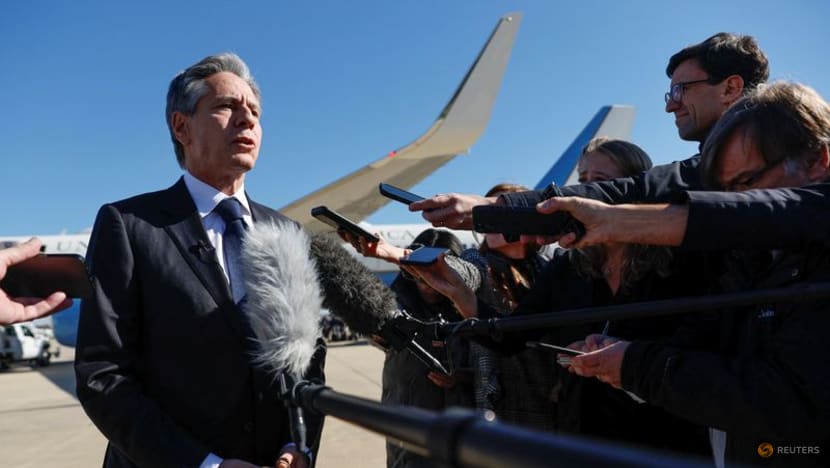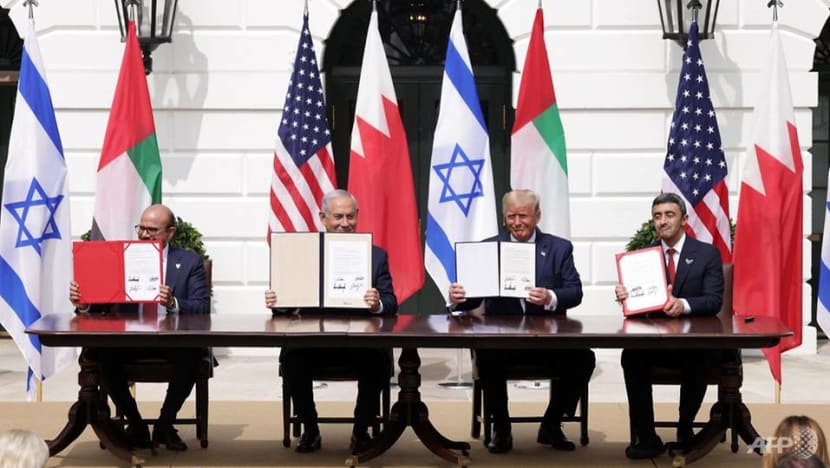Blinken’s effort to prevent escalation of tensions in Middle East a ‘tall order’, but US still hold sway: Experts
On his second Middle East trip in less than a month, United States Secretary of State Antony Blinken aims to contain the response of Israel, which has been striking targets in the Gaza Strip in an attempt to eradicate Hamas since the Oct 7 attacks on its soil.


This audio is generated by an AI tool.
As top United States diplomat Antony Blinken visits Israel on Friday (Nov 3), he would be looking to prevent the crisis from escalating in the Middle East, in part by containing Israel’s military actions, experts told CNA.
Despite having voted against a United Nations (UN) resolution calling for a humanitarian truce in Gaza, the US can still impact developments as it holds sway over Israel, having proven its support.
“I do think he will succeed at least somewhat, because the US has shown themselves to be a key ally and reliable ally of Israel and that gives him credibility, which translates into leverage,” Ms Laura Blumenfeld, senior fellow at the Philip Merrill Center for Strategic Studies at Johns Hopkins School for Advanced International Studies, told CNA’s Asia First on Friday.
“I think it's been a crash test on the credibility of the US and I think they've earned their place at the table with the Israelis to demand more of them.”
On his second Middle East trip in less than a month, US Secretary of State Blinken would be aiming to contain the response of Israel, which has been striking targets in the Gaza Strip in an attempt to eradicate Hamas since the Oct 7 attacks on its soil.
Mr Blinken said discussions will focus on the future of Gaza when and if the Palestinian militants of Hamas are defeated, getting more humanitarian aid into Gaza, and finding ways to prevent the conflict from spreading.
The US has been a strong supporter of Israel, but international backlash on the way Israel has been conducting itself in Gaza has galvanised public opinion, forcing the Biden administration to respond to the pressures, said Professor Shahram Akbarzadeh, research professor in Middle East and Central Asian politics at Deakin University.
However, he told CNA938 that it would be a difficult balancing act for the US, given that it had opposed the UN resolution to protect civilians and uphold legal and humanitarian obligations in the Gaza Strip.
In vetoing the calls for a pause in the Israeli bombardment of Gaza, the US made its push for the respect of international law and protection of civilian lives “a very difficult argument to maintain”, said Prof Akbarzadeh.
BLINKEN’S AIMS
Ms Blumenfeld said Mr Blinken’s attempts to prevent the war from spreading in the next few days is going to be “super important”.
This comes as the leader of the Hezbollah militant group in Lebanon addresses the Israel-Gaza conflict publicly for the first time, while the leaders of Iran and Hamas meet.
“Up until now, President Biden has followed a policy of ‘speak softly but carry a big aircraft carrier’... And I do believe Secretary Blinken when he says superpowers don't bluff,” said Ms Blumenfeld, noting that the US have matched their words with deeds, striking eastern Syrian targets and Iranian assets.
She added that miscalculation, however, is a key factor that could lead to an escalation of conflict in the region.
“There have been border skirmishes back and forth between Hezbollah and the Israelis. One miscalculation (and) one misfire, and the whole thing could blow,” said Ms Blumenfeld.
Prof Akbarzadeh said that top of Mr Blinken’s mind would be concern that “the American image is severely tarnished because of its support for Israeli actions”.
“I think the United States would be very keen to try and repair and show the Arab world that it is hearing Arab concerns (and) that it does try to address Arab concerns. But I think that's a bit of a tall order given how things have evolved,” he said.
However, Ms Blumenfeld noted that one source of optimism is that the United Arab Emirates (UAE), which is part of the Abraham Accords, has not broken ties with Israel amid the conflict.
The Abraham Accords are a series of agreements signed in 2020 to normalise relations between Israel and several Arab states.

“I'd like to think of this as sort of a bloody referendum of the Abraham Accords, where Israel was able to join the region, in what was the Biden administration's main goal, which is to integrate the region for stability and economic cooperation,” she said, adding that the signatories are the “swing voters”.
“One of the things that Secretary Blinken is doing by visiting the region again is saying, ‘Stay the course, we're going to moderate Israel strikes, and we can all get to a better place at the end of this’.”
ISRAEL’S ENDGAME
For now, there remains no clear endgame in sight for Israel over the outcome of the situation in Gaza.
“I don't know who is going to be in charge in Gaza, because Israel doesn't want to see Hamas come back and take over and there is no desire on the side of the Palestinian Authority in the West Bank to come into Gaza on the back of Israeli tanks,” Prof Akbarzadeh said.
“I don't really see what the solution is. We might end up with a military occupation.”
He said that while Israel has committed itself to the eradication of Hamas, it is not a realistic objective.
“Even if Hamas as the fighting force is eradicated, the end result of all this bombardment and the casualty toll (and) the death that was inflicted on the Palestinian population, is surely going to lead to another group that is just as antagonistic and just as committed to the destruction of Israel as Hamas is,” said Prof Akbarzadeh.
Ms Blumenfeld noted that the Israelis “have been very careful about who they say will run Gaza afterward”.
The Palestinian Authority or any other Palestinian group would be careful about associating with Israel, as it would immediately delegitimise them, she noted.
“I think they are hoping for some kind of international (solution), perhaps with the cooperation of the broader Arab states in the Arab region. But they are not going to say anything now about Palestinian rule, because they will be seen as puppets of the Israeli military,” said Ms Blumenfeld.
ACCOUNTABILITY TO CIVILIANS
Ms Blumenfeld shared that the head of Israeli military intelligence once explained to her the dilemma over the question of civilian casualties.
“The way he put it was, ‘We have a terrorist and we know that he's going to walk into a restaurant and blow himself up and kill 20 people. But if we take him out, then we'll kill three civilians. How do we live with ourselves?’ So that was the question that the Israelis struggled with, before October 7,” she said.
However, the Israeli perspective changed after the Oct 7 attacks, and it became an “existential battle” as the idea of the Jewish state went from safe haven to slaughterhouse, said Ms Blumenfeld.
“So I think the mindset has shifted and military planners have said that they'd rather be hated and alive, than loved and dead. It’s very stark and troubling, but this is the position they see themselves in today,” she said.
In terms of accountability, some Israelis feel that their political leaders let them down after failing to protect them from the attacks, while the Hamas group may not survive politically on the Palestinians’ end, said Ms Blumenfeld.
But ultimately, it is the victims who bear the biggest losses, she added.
“As far as justice (goes), that's the tragic point about all of this, right? There is really no justice ultimately for the victims,” she said.














